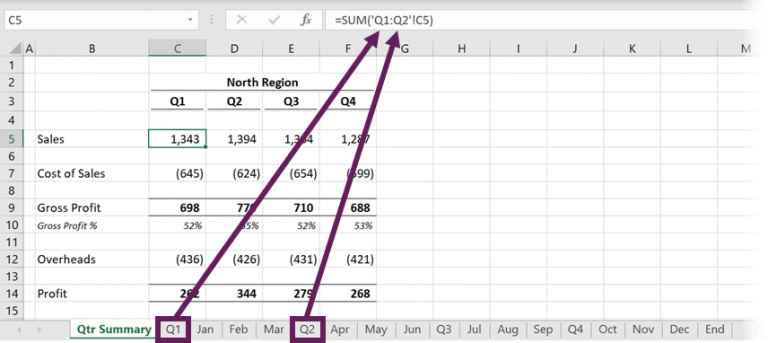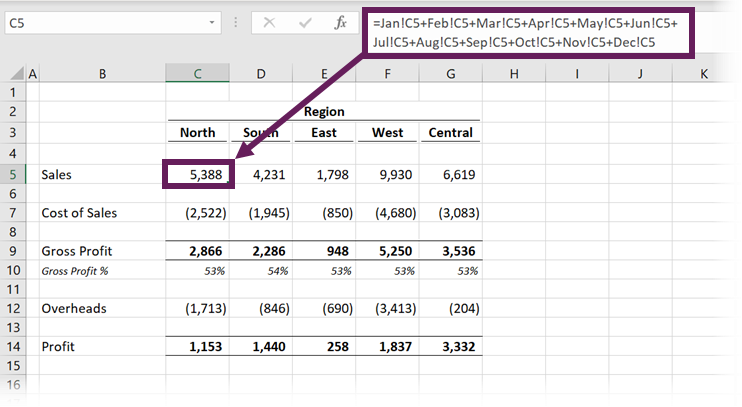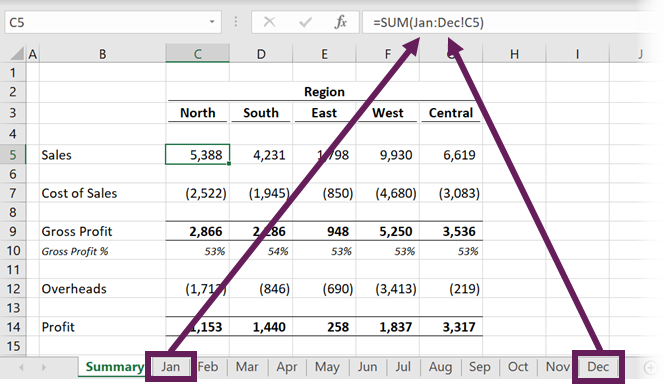
The power of Excel lies in its ability to manipulate and analyze data in various ways. One common task that users encounter is the need to sum data across multiple sheets in a workbook. This can be a daunting task, especially for those who are new to Excel or have limited experience with its functions. However, there are several methods to achieve this, each with its own strengths and weaknesses. In this article, we will explore five ways to sum across multiple sheets in Excel, discussing the step-by-step processes and the scenarios in which each method is most useful.
Summing Across Multiple Sheets Using Formulas
Excel formulas are a powerful tool for calculations and data analysis. When it comes to summing data across multiple sheets, formulas can be a straightforward and efficient solution.
Method 1: Using the SUM Formula
One of the simplest ways to sum data across multiple sheets is by using the SUM formula. This formula allows you to sum a range of cells, but it can also be used to sum data from multiple sheets by specifying the sheet names in the formula.
For example, suppose you have data in cell A1 on three different sheets named Sheet1, Sheet2, and Sheet3, and you want to sum this data. The formula would look like this:
=SUM(Sheet1!A1, Sheet2!A1, Sheet3!A1)
This formula sums the values in cell A1 on each of the three sheets.
Method 2: Using the 3D SUM Formula
Excel also offers a 3D SUM formula that can be used to sum data across multiple sheets. This formula is useful when you have a range of cells that you want to sum across multiple sheets.
The syntax for the 3D SUM formula is as follows:
=SUM(Sheet1:Sheet3!A1)
In this example, the formula sums the values in cell A1 on all sheets from Sheet1 to Sheet3.
Method 3: Using Named Ranges
Named ranges can also be used to sum data across multiple sheets. By defining a named range that includes the range of cells you want to sum on each sheet, you can then use the SUM formula to sum these ranges.
For example, suppose you have defined a named range called "MyRange" that includes cell A1 on each of three sheets. The formula to sum this range would be:
=SUM(MyRange)
This formula sums the values in the named range "MyRange" across all three sheets.
Summing Across Multiple Sheets Using PivotTables
PivotTables are a powerful tool in Excel for summarizing and analyzing data. They can also be used to sum data across multiple sheets.
Method 4: Creating a PivotTable
To create a PivotTable that sums data across multiple sheets, follow these steps:
- Select the cell where you want to create the PivotTable.
- Go to the "Insert" tab in the ribbon.
- Click on the "PivotTable" button.
- In the "Create PivotTable" dialog box, select the range of cells that you want to sum.
- Click "OK" to create the PivotTable.
Once you have created the PivotTable, you can customize it to sum the data across multiple sheets.
Summing Across Multiple Sheets Using Power Query
Power Query is a powerful tool in Excel for data manipulation and analysis. It can also be used to sum data across multiple sheets.
Method 5: Using Power Query
To use Power Query to sum data across multiple sheets, follow these steps:
- Go to the "Data" tab in the ribbon.
- Click on the "From Other Sources" button.
- Select "From Microsoft Query" and click "Connect".
- In the "Query Editor" window, select the range of cells that you want to sum.
- Click on the "Close & Load" button to load the data into a new sheet.
Once you have loaded the data into a new sheet, you can use the SUM formula to sum the data across multiple sheets.
Gallery of Summing Across Multiple Sheets




FAQs
Q: How do I sum data across multiple sheets in Excel?
A: There are several ways to sum data across multiple sheets in Excel, including using formulas, PivotTables, and Power Query.
Q: What is the best way to sum data across multiple sheets in Excel?
A: The best way to sum data across multiple sheets in Excel depends on the specific needs of your project. Formulas are a straightforward solution, while PivotTables and Power Query offer more advanced features for data analysis.
Q: Can I use named ranges to sum data across multiple sheets?
A: Yes, named ranges can be used to sum data across multiple sheets. By defining a named range that includes the range of cells you want to sum on each sheet, you can then use the SUM formula to sum these ranges.
Q: How do I create a PivotTable to sum data across multiple sheets?
A: To create a PivotTable to sum data across multiple sheets, select the cell where you want to create the PivotTable, go to the "Insert" tab in the ribbon, click on the "PivotTable" button, and select the range of cells that you want to sum.
Q: What is Power Query and how can I use it to sum data across multiple sheets?
A: Power Query is a powerful tool in Excel for data manipulation and analysis. To use Power Query to sum data across multiple sheets, go to the "Data" tab in the ribbon, click on the "From Other Sources" button, select "From Microsoft Query" and click "Connect", select the range of cells that you want to sum, and click on the "Close & Load" button to load the data into a new sheet.










